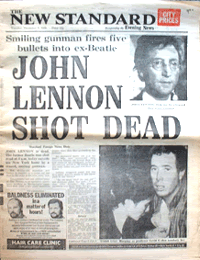Some of us have the gift and some of us, well... we could use a little help when it comes to loglines. Our Logline Clinic at the old Kickass Resource helped a lot of writers get the necessary elements of a logline squeezed into one or two sentences and in the most intriguing "you'll want to read this screenplay for sure now" way possible. Like writing whole screenplays, there are basic building blocks or elements to be covered but there really is only one main rule: make the person(s) who will read your logline want to know more about your project. So, whatever works toward that end, that's the correct way to write a logline. When I made a good contact with an agent a few years ago, he was willing to give my screenplay a read based simply on the fact that he was told to read my screenplay by his boss (who was friends with one of my best friends - otherwise, I never would have made that connection). This agent was very helpful to me, someone I could call up with any kind of question. The first thing he told me was, "Hate your logline. You'll have to redo that before we send this thing out." What was he talking about? I slaved over that little sucker. I agonized over it. That logline was as perfect as perfect could be. So I asked, "What's wrong with it?" The agent said, "Loglines do not retell the plot of your screenplay even if you can squeeze it into one sentence. Loglines tell the reader what your story is about. Get it? They do not retell the actual story, they only say what the story is about. Rewrite that thing. Now." Ahhh... my pea brain actually "got it." Instead of being consumed with informing the reader of the most vital plot points in their proper order or as many as could be crammed into one sentence, just say in general overall terms what the story is about. Okay, I'm cool with that. I went from a neatly micro-packaged (but very heavy-feeling) into one sentence plot progression to a lighterweight overall summary type of sentence. The agent liked that one better but he still wanted it tweaked. Instead of my main character's proper name of Mary Beth ("What the hell is a Mary Beth? The g-damn Singing Nun? Your f-cking name tells me squat about this character!"), this guy wanted to know who or what my main character was. What one aspect of her personhood or her function in this story was critical for the reader of the logline to know in order to get a mental fix on her, thus allowing the reader to feel the "reality" or central purpose of this character as they imagined that character in the pickle my story would place them. Okay, so I twisted and turned on that one. There was so much I wanted the reader to understand. But, what would give the reader an instant fix on who this character was? What one aspect of this character was "core" in terms of how this character related to every other aspect of my story? She was a single working mom and overprotective parent of an emotionally damaged child (the reason for the psychological trauma being one of the building blocks of the story - but of course, that didn't go into the logline). So, okay, Mary Beth became "a working mom." Better, said the agent. More correct in terms of what a logline is meant to be, said the agent. But boring, said the agent. Oy, oy, oy. What the hell does this guy want???? Mr. Agent told me in stripping out plot points and actual story structure from my logline and reforming it into more general terms, I'd lost the sizzle out of the steak. He said my logline needed to be unique, to make the story of a namby-pamby PTA Mommy throw out an emotional hook that would grab that reader and not let go. My logline needed concept or theme. So Mr. Agent asked, "Why did you write this story in the first place? What intrigued you as the writer? What dramatic question are you asking (and answering) with the writing of your story? What is its central theme? You can give the reader that special something, that unique something, without resorting to the retelling of the actual story." Every question can have more than one answer. I've been a Sam Peckinpah fan ever since watching Dustin Hoffman in, "Straw Dogs." If you are a writer who wants to understand what "character arc" is all about, you must see this movie. Dustin Hoffman starts out as a namby-pamby sort of fellow and the life-or-death struggle that's thrust upon him turns him into a mad dog killer. He kills because he must kill. There simply is no other choice. How he got to that place is a fascinating study in character. And that, my dears, was the pure essence of my story. What violence might any of us be capable of doing? And there you have a dramatic question just begging for a story to answer it. If a friend called you up and said, "Let's go see that movie about that nice PTA Mommy," you'd think what, I should spend money on falling asleep? But, if you knew the sweet PTA Mommy was driven to the precipice of committing the ultimate act of violence - killing another human being - wouldn't you want to know whether or not she pulled the trigger? So, that was my "hook." That's what made my story unique or at least, attention-grabbing enough to finally please Mr. Agent. My logline was concise, very trim, no fat content, no extra wordage. My logline did not attempt to tell the screenplay's story condensed down into one sentence. My logline only told the reader what the story was about. In my logline, my main character was a character type as opposed to a character name. My logline inserted a hook or point-of-intense-interest for the reader by way of remembering the theme or dramatic question that needed answering. And by doing that, I allow the reader to see that there is a deadly threat or opposing force to this main character. Without being cartoonish in my logline's word choices, I left the reader hanging off that proverbial cliff. I left them wanting to know more. And Mr. Agent gave it his seal of approval. The other thing I found out from Mr. Agent is that there are certain days of the week and certain times of day that you never call an agent. Ever. Heh heh... Well, there are as many opinions on "how to write a logline" as there are loglines floating around Hollywood and I wouldn't ever steer anyone into thinking they should just take my word for it soooooo... here are a few more tips and tricks of the trade when it comes to logline writing: The Logline: What It Is, Why You Need It, How To Write It Creating Bomb-Proof Loglines How to write a Logline The Perfect Logline by Rob Tobin (PGLer) Premise -- Foundation of Storytelling
Many writers struggle with understanding the difference between what a story is and character goals. This essay offers a method to create a one sentence story premise that sets out a story's dramatic foundation. Anatomy of a Logline Moondance Advice on Titles & Loglines "Logline" from a UK Writer's Blog VeniceArt's, "What is a logline?"
with a list of sample loglines The Logline Selling Secrets of the Selling Trade -
Proven Advertising Techniques Can
Make Your Queries & Loglines
Stand Out From The Pack | 











